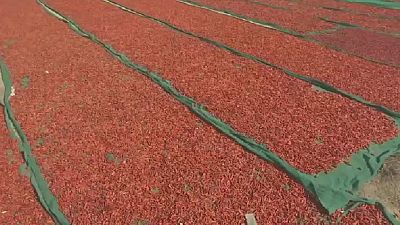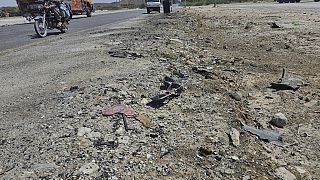Pakistan
The chili industry in Southern Pakistan risk destruction due to climate change.
Farmers in Sunri suffered a 40 percent drop in production last year due to scorching temperatures and lack of rain.
Mian Muhammad Saleem is the President of the Red Chilli Growers’ Association.
“We yielded 50 percent more red chillies this year than we harvested in 2017-18, but unfortunately overall production of red chillies has gone down in 2019 and it made impact on the price of chillies and its rates doubled. We have produced 125,000 tons of red chilli crops in 2018, and in 2019 we have produced only 70 to 80,000 tons of red chilli crops”, Saleem said.
Saleem says its time for the government step in to help.
“The government should intervene on an emergency basis and must introduce seeds that should be heat tolerant or heat resistant, unfortunately we have been complaining for a long time but our all efforts have been in vain”, he added.
Dr. Muhammad Mithal Jiskani has done research which shows that each acre in the area’s 135,000 acres of chilli crops supports five families.
“We have been harvesting chillies on time but due to climate change, weather is shifting its cycle and it causes the sudden rise of heat waves that have an impact on red chilli crops”, the Associate professor at the Department of Plant Pathology, Sindh Agriculture University said.
“I have been working here since childhood, working as labourer in the red chilli market as it is only work that I can do”, Sikandar Khan, Laborer said.
Chillies are crucial here, accounting for 85 percent of the city’s economy.
The red chilli is famed for its unique taste. But if climate change alters this agricultural area, it could become a scarce ingredient.
In 2018, red chillies cost $46 per ton, but last year soared to $117 per ton, according to the Red Chilli Growers’ Association.
AP














01:22
World will have to learn to live with heatwaves, UN says
01:36
CO2 emissions on track to push Earth beyond 1.5 degree threshold by 2028, report finds.
02:08
Gunman attack in north-central Nigeria: death toll climbs to 150
11:14
Rwanda Walks Away: what’s behind the Central Africa rift? [Business Africa]
00:24
Greenland and Iceland saw record heat in May
01:30
Macron sparks global push to protect oceans